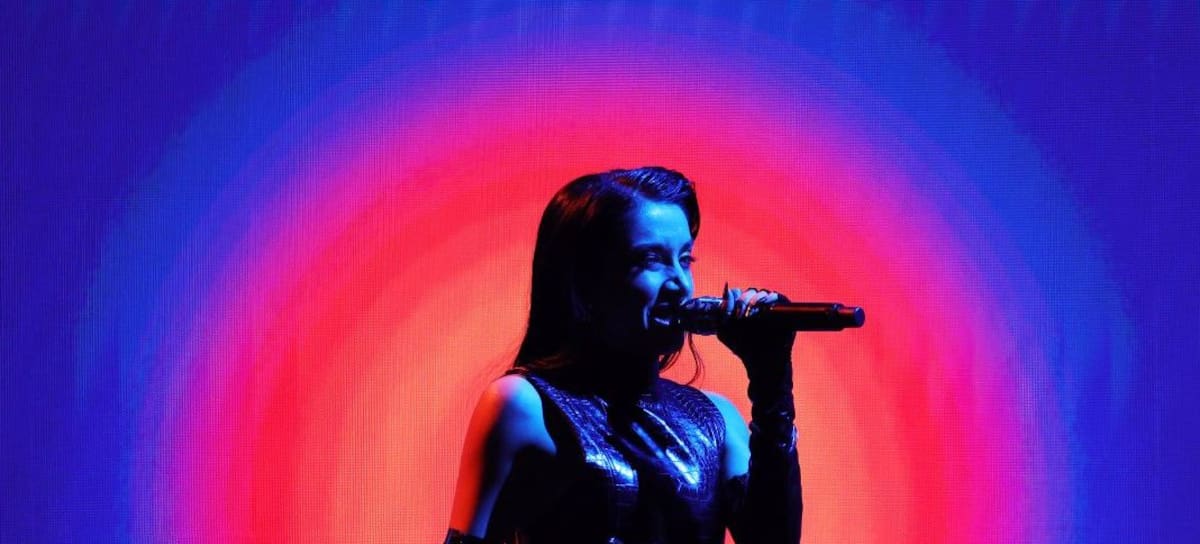María Becerra: «I’ve Met a Lot of Mean and Self-Serving People That Wanted to Take Me to the Wrong Places»
La Nena de Argentina speaks openly about her trajectory and experiences in the industry

María Becerra performs onstage during the 64th Annual GRAMMY Awards at MGM Grand Garden Arena on April 03, 2022 in Las Vegas, Nevada. Rich Fury / Getty Images for The Recording Academy
Adriano Moreno (Benidorm, Spain) – María Becerra is waiting for me in a random (but beautiful) location at the luxurious Hotel Meliá Villaitana in Benidorm (Spain). We’re far away from the hubbub of the pool party so we can talk quietly while she enjoys a cup of tea.
«You’re wearing flip-flops», she says when I sit down in front of her.
It’s a picture to behold. I’m wearing a garish swimsuit and an old T-shirt. She looks great in her pink corduroy jacket and super-high white boots. One of the press guys steps forward and justifies my looks. He reminds her – not in those words exactly – that sheis in Desalia Festival territory and that this is the regulation uniform for the festival that carries the celebration of vive now.

María Becerra in Desalia Festival (Benidorm, Spain) / EnSerio for Ron Barceló

María Becerra in Desalia Festival (Benidorm, Spain) / EnSerio for Ron Barceló
I tell her that I changed the focus of the interview at the last moment. She had already been with my colleagues from LOS40 Global Show and LOS40 Urban presenting her song for Fast X and I don’t want to make it repetitive. Instead, I ask her to take stock of the last four years.
To go back to the origin of her success and to know how she feels, who in a very short period of time has gone from being a 19 year old girl with a great potential for music to become La Nena de Argentina, one of the most important Latin artists of the moment.
How do you remember the girl who released ‘High’, the song that changed absolutely everything?
That song took me to another place, it was an incredible change. It was all a big learning curve. You know, ‘High’ was born out of pain. It’s ironic, isn’t it? Out of so much pain came the best thing that could have happened to me.
Do you pinpoint the exact moment when you became aware that you had become a world-renowned artist?
It was with ‘Qué más pues?’. With that song, J Balvin and I reached the global top. Suddenly, it became very viral. I think it has like two million videos on TikTok, which is huge. I would see people from the U.S. and Korea trending it. They also tagged me when they played it in a club in Colombia, in another one in Chile… That’s when I realized how powerful the song was.
It was very hard to go through that, to go through what comes with fame.
How did you manage it? It must be overwhelming to go from being a pop superstar in such a short period of time.
I feel like it was hard at first. No one is prepared to be famous. Well, there are people who are, people who get even prepared to be. But it wasn’t something that was going to happen to me. I was doing my music and that was it. I thought it was going to take me a lot longer to get to that place. It was all very sudden, very sudden. That was the hardest thing. Being such a young person, with so little life and work experience, in such a big industry and with worldwide exposure..It was very hard to go through that, to go through what comes with fame: the criticism, the self-serving people, the context of the parties…
And have you learned to differentiate which people approach you out of interest and which people don’t?
I learned by taking a lot of hits and making a lot of mistakes. That’s the way we all learn. Inevitably I had to go through that. I met a lot of mean and self-serving people who wanted to lead me to the wrong places. Maybe to have an easier way to manipulate me and have me weaker, in a situation where I was so vulnerable that I needed help. Those same people told me they were going to help me and those same people were the ones who got me into trouble. They were really screwed up people. Luckily I have a family and a very present work team that helped me understand what was going on. When you are in a place like that, you don’t understand. Sometimes I felt so lonely that I looked for love, understanding and affection. And I tell you that I had my family and my friends, but sometimes it was not enough. Sometimes I was looking for something else, another kind of relationship, another kind of affection.
The artist’s life is frenetic and sometimes it’s hard to stop and enjoy personal success. In your case, María, have you been able to reflect on your professional achievements, to stop and think about all the good things that are happening to you?
I digest it with a lot of delay. At the moment I give it my all so that what I’m doing turns out amazing and then, when the tension drops, is when I fall and say: ‘wow, I can’t believe what we did’. That’s when I digest it, but at the exact moment it’s difficult. I have to take care of a lot of things and I have to be emotionally strong.
«A lot of artists I admired approached me and I ended up getting disillusioned»
You’ve become a kind of amulet for artists. Everyone wants to collaborate with you. How does that make you feel?
I had a moment when my manager’s phone kept ringing. That’s what I’m telling you, people show up who are interested. Which is good because if I collaborate with an artist I like there is also an interest in me. It’s a common interest, it’s work and it’s perfect. But there are people who are not very human in that sense. People who don’t want to talk to me, who don’t want to write the song with me, who don’t want to record the song in the studio with me. They just send the manager the song and say, ‘We want Maria to record on such and such a date.’ Too much business, too robotic. There is no link and music is born from the link, from emotions. If I don’t connect with you in the studio… maybe we are missing the opportunity of our lives to make the best song. But it’s all the mail, and the voice here and the voice there. It’s all very fake, very untrue and very posed. That was also very hard because a lot of artists I admired approached me and I ended up getting disillusioned.
Is there anything you take away from the music industry that has strengthened you to keep growing as an artist?
I learn many things every day, but the most important one was to understand my limits, to learn to say no, to know how to say yes too. Losing my pride in many aspects. Also to stop being so impulsive. Before I would get angry about something and I would go to Twitter and fuss. Now I think about it, I consult with the team because what I do also affects them.
A few weeks ago something historic happened in the Top 50 of Spotify Spain. Four women, Lola Índigo, Shakira, Rosalía and Aitana, topped the list with their respective songs. Something, at last, is changing, isn’t it?
It’s a dream. I know Lola Índigo and I know how much she deserves it. Lola is one of the people who most deserves to do well and be the most successful. I know how hard she works, how talented and how much potential she has. I felt that people were not being able to see it and now they are, they are appreciating her and realizing what kind of artist she is. She has also had her tough experiences in terms of the male environment in the industry. It is difficult because you lose opportunities, autonomy and decisions just for being a woman. There are many cases and we have to continue to be responsible about it, supporting emerging talent, collaborating with each other. We have to put aside something that used to be as natural as competition among us. Before, if one of us was the biggest pop singer and I was second, I had to hate her and step on her head to grow. It’s great that all that is disappearing. In fact, if you see someone behaving like that, the behavior is repudiated.
You can read here the Spanish version of the interview originally published in Spanish by Adriano Moreno
Ana Rojas
Periodista en LOS40, coordinando LOS40 USA y colaborando también en El País. Cubro temas de música,...
